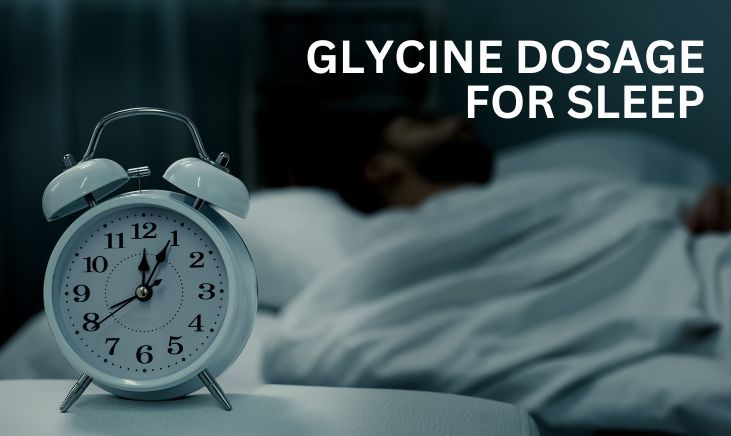Glycine is a tiny amino acid that plays a big role in sleep. It’s involved in producing serotonin, the precursor molecule to your sleep hormone, melatonin.
Taking 3g of glycine before bed can improve sleep latency, increase sleep efficiency, reduce insomnia symptoms, and promote better quality sleep.
Table of Contents
Quick Look
- Glycine is an amino acid involved in many functions, including collagen production, digestion, metabolism, and sleep.
- Taking glycine before bed can increase serotonin synthesis, reduce body temperature, and decrease sleep onset latency.
- Just 3g of glycine at bedtime may support better and more efficient sleep.
- Glycine can be obtained through dietary supplements or natural food sources.
What is Glycine?

Glycine is a non-essential amino acid naturally produced in the body from other compounds, such as serine, choline, and threonine. It functions as both an excitatory and inhibitory neurotransmitter in the central nervous system (CNS) via N-methyl-D-aspartate type glutamate receptors and glycine receptors, respectively. Simply put, glycine can increase and decrease activity in the nervous system, depending on the type of receptor it binds to.
What Does Glycine Do?
Glycine is an important amino acid that exerts widespread effects in various body systems, with involvement in cardiovascular health, cognitive function, and metabolic health.
Some of the most common uses of glycine are for:
- Memory: Glycine binds to the N-methyl D-aspartate receptor, and because the NMDA receptor complex is involved in long-term potentiation, which is thought to be linked to learning and memory, glycine may enhance cognitive function without stimulant effects.
- Insulin sensitivity: Studies suggest that low circulation concentrations of glycine are a strong predictor for glucose intolerance and type 2 diabetes. Increasing glycine levels may improve insulin sensitivity.
- Skin and joint health: Glycine is a non-essential amino acid required in large amounts to satisfy the demands for collagen synthesis. Increasing glycine intake can promote cartilage regeneration by enhancing collagen synthesis, thus strengthening skin, bones, and joints.
- Digestion: Glycine serves as an essential substrate for synthesizing several biomolecules, including glucose and glutathione (GSH), but it is also used in detoxification via conjugation of endogenous or xenobiotic toxins.
- Immunity: Glycine plays several roles in the immune system, including promoting the production of the master antioxidant, glutathione, a potent free-radical scavenger that helps to protect cells and mitigate inflammation, and it is required for the proliferation and antioxidative defense of leucocytes. A deficiency of glycine can impair immune responses.
- Serotonin production: Glycine supplementation increases endogenous production of 5-hydroxytryptamine (5-HT), also known as serotonin or your happy hormone.
There’s one health benefit of glycine we didn’t touch on—sleep. Keep reading to learn about the sleep benefits of glycine.
Key takeaway: Glycine is an excitatory and inhibitory neurotransmitter involved in brain health, digestion, immunity, metabolism, sleep, and more.
Glycine and Sleep: How Does It Work?

Glycine is an excitatory and inhibitory neurotransmitter, depending on its binding site. Binding to N-methyl-D-aspartate type glutamate receptors can increase nervous system activity, while binding to glycine receptors can decrease CNS activity.
Simply put, glycine is a multitasker that can tell the nervous system to fire up or wind down.
But when it comes to sleep, we turn to glycine’s inhibitory effect.
So, how exactly does it work?
The primary mechanism behind glycine’s ability to support sleep is inhibiting CNS activity and inducing a calming effect on the brain. By reducing neuronal activity, glycine effectively lowers anxiety and stress levels, preventing overstimulation and promoting a positive mental state for sleep.
Specifically, the hormone orexin regulates the sleep-wake cycles by inducing arousal, alertness, and attentiveness. Glycine inhibits the activity of orexin neurons to block wake-promoting signals within the brain and subsequently promote sleep.
Glycine and Melatonin: What’s the Difference?
Before we get to the benefits of sleep, you might wonder about another sleep-promoting compound called melatonin. While glycine and melatonin exhibit similar effects, they actually fall into unique categories of their own.
- Melatonin is a sleep-producing hormone produced from its precursor, serotonin, in the pineal gland. It’s made in response to darkness and plays a major role in regulating your circadian rhythm or internal clock. On top of promoting sleep, melatonin also plays a role in eye health, mitochondrial health, and more.
- Glycine is a non-essential amino acid that functions as both an excitatory and inhibitory neurotransmitter in the CNS. It crosses the blood-brain barrier and supports sleep by lowering body temperature and acting as the precursor to serotonin and, subsequently, melatonin.
In simple terms, melatonin is a hormone, while glycine is an amino acid neurotransmitter. While they both promote and maintain sleep, melatonin comes further down the chain than glycine.
Benefits of Glycine for Sleep

If you’re struggling to get the quality sleep you need, there are several supplement options, including melatonin, L-theanine, valerian, GABA, and tart cherry, all of which offer their own mechanisms and benefits.
Glycine, however, has some unique benefits that make it a top choice for tired folks looking for a good night’s sleep.
Here’s how glycine promotes sleep:
- Reduces nervous system activity (calms the mind and body)
- Improves sleep latency
- Increases sleep quality and efficiency
- Reduces core temperature
- Increases serotonin levels
Let’s dig into some of these deeper.
- Lowers Core Body Temperature
Have you ever tried to sleep in a hot room? If you have, chances are you’ve struggled. Environmental temperature is one of the most important factors that influences sleep. Like sleep, body temperature also follows a cycle that aligns with the sleep-wake rhythm, decreasing during sleep and increasing during wakefulness repeatedly over a 24-hour circadian rhythm. This happens as a result of an increase in peripheral skin temperature due to reduced activation of noradrenergic vasoconstrictor tone, thereby allowing heated blood to be drawn away from the core and facilitating heat loss through the skin.
So, how does glycine fit into the picture?
Glycine helps to increase blood flow to the extremities, which reduces core body temperature. This drop in core body temperature is an important component of the physical progression into the sleep phase. Studies show that glycine administration significantly decreases core body temperature via increased cutaneous blood flow, which may improve sleep onset and quality. Other studies show that taking glycine before bed can help you fall asleep faster, stay asleep, and reach deep, slow wave sleep sooner.
- Increases Serotonin Levels
Serotonin doesn’t directly affect sleep, but sufficient amounts are required to produce melatonin, the sleep hormone. Melatonin is produced in the brain’s pineal gland in response to darkness and controls your sleep-wake cycle. People who have difficulty sleeping or have sleep disorders like insomnia and sleep apnea generally have low levels of melatonin. As such, increasing serotonin levels may help restore healthy sleep cycles and encourage deeper, more restful sleep.
Research shows that people with low levels of serotonin spend less time in deep sleep and have a higher risk of insomnia and depression. Oral glycine supplementation can boost serotonin production, facilitating melatonin synthesis and healthier sleep patterns.
- Improves Sleep Onset Latency and Sleep Quality
Hitting REM is important for full-body rejuvenation and to wake up feeling rested. It might be time to add some glycine to your nighttime routine if you’re not hitting the pillow and waking up in the morning without interruption. A 2015 rodent study suggests that glycine can increase non-REM sleep latency, which may help you get into REM faster. Other studies show that oral administration of glycine—a dose of 2g/kg of body weight—significantly increased non-REM (NREM) sleep and reduced waking time in sleep-disturbed rats.
- Reduces Symptoms of Insomnia
It’s estimated that roughly 10% of the adult population struggles with insomnia, while another 20% experiences occasional insomnia symptoms. The following symptoms are characteristic of insomnia:
- Difficulty falling asleep
- Waking throughout the night
- Inability to fall back asleep after waking
- Early waking
- Feeling tired after waking
- Difficulty napping even if tired
- Fatigue and irritability during the day
- Difficulty concentrating because of fatigue
Here’s the thing with insomnia: It’s not just about your sleep. Insomnia seriously impacts other areas of your life and can reduce the quality of your life in general.
That said, plenty of natural remedies can help, including glycine. A 2012 study published in Frontiers in Neurology examined the effects of glycine on daytime fatigue, which is frequently a symptom of insomnia. Researchers found that taking glycine improves sleep quality for people experiencing light insomnia and those with occasional sleep restrictions.
How to Take Glycine for Sleep

If you want to increase your glycine levels, there are two options:
- Food sources
- Oral glycine supplement
Glycine is mainly found in animal products, so plant-based eaters will likely have to take supplements. Some of the best sources of glycine from food include:
- Bone broth (gelatin)
- Red meat
- Seeds
- Turkey
- Chicken
- Pork
- Peanuts
- Canned salmon
Plant-based sources offer lower amounts of glycine, but it can still be found in beans, spinach, kale, cauliflower, cabbage, pumpkin, and fruits like banana and kiwi.
Alternatively, you can opt for powder, which can easily dissolve into food, liquids, or capsules. While taking glycine supplements to address sleep issues is generally safe, it’s important to understand that taking too much of any single amino acid could disrupt the balance of amino acids in the body. That said, research shows that glycine absorption is lower on its own than when bound to other amino acids. As such, taking an essential amino acid supplement containing glycine might be a better option.
Glycine Dosage for Sleep
So, what’s the proper glycine dosage to promote a deep, refreshing sleep?
Like most supplements, no specific glycine dose for sleep will work for every individual. Still, most studies suggest that 3 grams of glycine before bed can improve sleep quality and reduce daytime sleepiness.
The body also requires about 2 grams of glycine per day taken in through diet. Animal-based, protein-rich foods offer the highest concentration of glycine to meet your daily requirements.
Glycine Side Effects
As with most supplements, side effects aren’t common, but they do happen—that’s why knowing what to look for is important.
Glycine is generally considered safe as a supplement and is well-tolerated by healthy adults, but the following side effects may occur:
- Nausea
- Vomiting
- Stomach upset
- Soft stools
There are also contraindications to be aware of:
- Pregnant or breastfeeding women: There isn’t sufficient evidence to suggest glycine supplements are safe during pregnancy or lactation, so pregnant or breastfeeding women should practice safety and avoid use. That said, reaching your daily glycine requirements through diet is still important.
- Schizophrenia drugs: People taking Clozapine (brand name Clozaril) should avoid supplementing with glycine, as the combination could reduce the effectiveness of the medication.
If you’re unsure whether supplementing with glycine is safe, consult your healthcare provider.
FAQs
Does glycine make you sleepy?
No, glycine doesn’t directly make you sleepy, but it can increase the production of serotonin. Serotonin is the precursor to the hormone melatonin, which controls your sleep-wake cycles. An increase in melatonin levels triggers sleep.
How much glycine should I take to improve sleep?
Most studies suggest that 3 grams of supplemental glycine before bed can have a positive effect on sleep quality and reduce daytime sleepiness.
Does glycine help you sleep?
Yes! Glycine promotes better sleep by helping reduce core body temperature, increasing serotonin production, and increasing sleeping onset latency.
Can glycine cause insomnia?
Several factors contribute to insomnia, but glycine isn’t one. People taking glycine for insomnia have reported improved symptoms, likely through its ability to increase serotonin and melatonin production.
Which amino acid is better for sleep, glycine or GABA?
Glycine and GABA both have positive effects on sleep. GABA is an inhibitory neurotransmitter that helps reduce nervous system activity to induce calmness, while glycine supports sleep by lowering body temperature and increasing serotonin (melatonin) production. Which supplement works better depends on the sleep issue.
Can you take glycine and magnesium together?
Yes! Magnesium glycinate is produced by combining magnesium and glycine. While there are several forms of magnesium, magnesium glycinate (or bisglycinate) is considered one of the most effective and well-tolerated forms.














